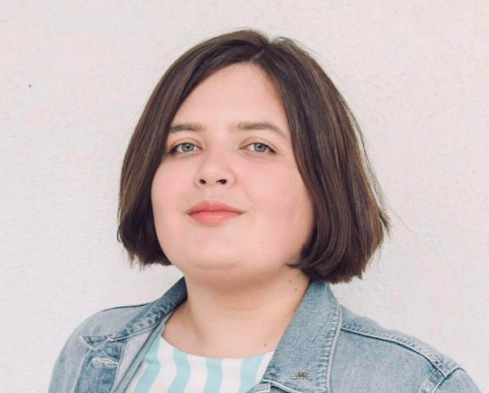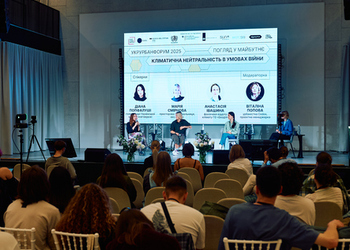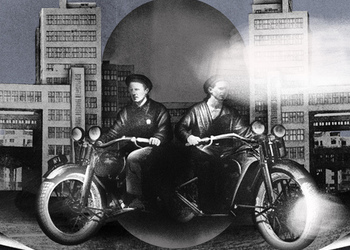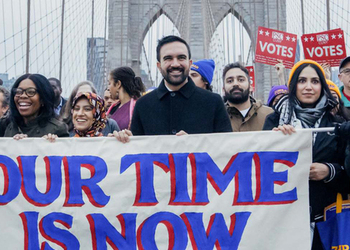Older people are one of the vulnerable social groups living in the cities. Sometimes those people have less leisure and active lifestyle opportunities. Ukrainian cities are not adapted to the needs of the older people, as the public transport and spaces are not barrier-free. Moreover, Kyiv and other cities have no comprehensive programs aimed at the interests of older people.
In early 2018, over 43,000 recipients of benefits were registered in Podil District, and 81% of them were retirees by age. Older people are the core clients of city social services, which serve them as centers of leisure, personal growth, and interaction with other people. Meanwhile, far from all retirees can even use these services. So these people are often left out of city life.
In November 2019, Internationaler Arbeitskreis e.V. in partnership with Center for Society Research (CEDOS Think Tank) supported by the Ministry of Foreign Affairs of Germany organized educational exchanges for urban grassroots activists from Ukraine and Germany. The project was titled the Local Activists Dialogue for Cohesive Cities. As the continuation of the project, Mistosite presents the series of media publications about the (un)fairness in the contemporary urban milieu. The following article explores how the system of providing social services for older people works in Kyiv.

The Day Stay Center in Kyrylivska Street is very easy to find: in addition to a sign reading «Warming Center» the room’s window is decorated with paper snowflakes and handmade decor. Twice a week, the Center hosts rehearsals of older people’s choir, so you could also find it by following the accordion tune that can be heard outside.
The atmosphere inside is very lively: today, the Center’s clients are preparing a holiday program for the New Year’s Eve. Three women are standing around the accordion player and—despite the fact that there isn’t a single snowflake outside—singing: «These lands haven’t seen such a snowfall in ages.» There’s a sheet of paper on the desk at the window with a handwritten list of roles: Snigurochka, Blizzard, Snowstorm and so on. Most of the Center’s clients are women; the only two men are the accordion player and a blind guitarist who visits sometimes.
The trio have finished their song. Then they rehearse solo, and some of the women go out to the hallway.
«I’ve been rehearsing with the choir for seven years,» says one of them, the 71-year-old Tetiana Semenivna. «I’ve loved to sing all my life, but never worked on that because I had no time. One day, I met a friend at the bank, and she told me there was a choir here. We learn new things—for instance, how to breathe correctly for singing. We also learn new lyrics: it really helps to improve your memory and focus.»
«Which is extremely important for our elegant age,» adds another woman with short dark hair and immediately introduces herself: «Liudmyla Mykhailivna, nice to meet you. Tetiana Semenivna and I have been friends since sixth grade, and then we taught at the same school. But now I’ve been retired for seven years, and in 2013, I started going to the choir. I never sang, but here, I do it professionally, although I still haven’t learned how to breathe properly.»
The choir rehearsals are led by Valentyna Vashchuk, an energetic woman and a rapid speaker who, in the course of our conversation, manages to run out of one room into other several times and give out instructions to the performers. Officially, she is employed as a labor adaptation instructor, but everyone at the Center calls her a «cultural organizer.»
«I used to have a similar job before, I was already retired, but my soul hurt,» recalls Valentyna. «I gathered the choir, we used to rehearse in a different place, then we moved here. Even in the hardest times, we gave at least eight concerts every year. I’m always looking for a new repertoire, I search for old songs online, rewrite them, add poems and jokes to the program, stage dance numbers and scenes. I pick a special role for each performer, I tell them: girls, you need to find your own persona, and then the audience will listen to you with their jaws dropped.»
«At a recent library concert, I sang It’s Fall Again, Gentlemen. It’s chanson. And boy did the librarian sing along with me! Have you heard this song?» asks me the last singer in the trio, a tall woman wearing bright makeup, Liudmyla Ardalionivna.
«How could she hear it,» answers Valentyna for me. «She’s too young.»
The listeners who come to the concerts are mostly older people. The performances take place in the nearby libraries because the small office in Kyrylivska Street cannot accommodate all the clients. The Center serves more than 90 people, and over 230 others attend the branch nearby, in 24A Svitlytskoho Street. Both facilities are parts of the Podil District Territorial Center for Social Services. Sometimes the choir gives guest performances—for instance, in a military hospital or in a children’s cancer center. Anywhere they’re asked to perform.
«Although the libraries invite all the district residents to the events, young people aren’t very interested in our songs,» says Valentyna. «My son once listened to one and asked me, ‘Mom, where did you dig this thing up?’ But it’s OK, every generation has its own music.»
«Oh, won’t there be a choir rehearsal today?» Another lady came in from the street and was surprised to see her colleagues in the hallway. «There will be a dance rehearsal!» exclaims Valentyna with joy and immediately vanishes from the room.
Bridge to Life
In addition to the choir, the Center organizes some classes. Every Monday, there’s a Health and Longevity class where older people are taught about healthy lifestyle. There’s the Harmony Club, weekly meetings with creative people at the library; Our Native Land, Friday lectures by historians and researchers of the city of Kyiv; and other activities.
The class schedule, marked with a sharpie, hangs in the office of the Center Manager, Iryna Prokopchenko. «The name, ‘the Day Stay Center,’ doesn’t really let you understand what we do,» she says. «Sometimes people just bring their parents and want to leave them here for the day, like a daycare. We explain to them that we don’t have the conditions for that. We used to be called the Center for Social Adaptation, and that name communicated the point much better.»
Thematic workshops at the Day Stay Center of the Podil Territorial Center for Social Services is a part of the Kyiv system of Third Age Universities. These facilities give people an opportunity to learn new skills, so they don’t lose social activity with age. Third Age Universities function in every Kyiv district. Shevchenkivskyi and Dniprovskyi Districts each have two. But Podil District only has this substitute with various workshops. The Center also organizes theater and cinema visits, tours and other things for its clients.
«People come here every day,» says Iryna. «Sometimes they don’t care about the activities as much as about an opportunity to show off a new hairstyle, to put on a nice dress, to share a varenyky or pie recipe. In short, to talk. Older people come here and feel reinvigorated.»
However, Iryna believes that one of the biggest problems of these Centers is communication. Even though they have a social media page and event announcements on the Podil District Administration website, older people often have no skills to deal with computers and new technology. Volunteers who work with the Center teach them how to use the gadgets they own. «We print announcements, put them up in libraries, at hospitals, administrative facilities, but this is all done on our own enthusiasm,» sighs Iryna.
«We don’t have a computer or a printer. This is another problem, because people often come here with technical questions—for instance, how to pay utility bills. They don’t know how to do that online, they’re even afraid of ATMs. And if we had a computer, we could help them fill in their payment forms online. We hear promises that we’ll have everything on our smartphones soon. I’m really curious how they’re going to explain that to older people.»
Podil District Territorial Center for Social Services, of which the Day Stay Center is a part, keeps track of over 1,500 clients in its records. It has a humanitarian department, where people can get clothes and shoes, and two Day Stay branches turn into warming centers in winter. In collaboration with donors, the center hands out hot food to homeless people and everyone who needs it every two weeks. Another area of responsibility is working with children with disabilities, mostly with cerebral palsy. This center has eight children who live there permanently and another eight who are brought by their parents or carers to stay during the day. Psychologists, speech therapists, physiotherapists, and other specialists work with them here.
But the majority of the clients are lonely, some of whom get home care services because they cannot move around on their own or need extra support to do it. Social workers at home provide cooking, cleaning, hygiene and other kinds of services. Those who can take care of themselves and move on their own attend the classes and various events—for example, on the Veterans of Labor Day or the Anniversary of the Liberation of Kyiv from Nazi Occupation. Thus, with the humanitarian department, the center for children with disabilities, two-day stay centers, and five other daycare departments, the Territorial Center for Social Services has nine structural departments in the district.
«Older people mostly have problems which we don’t even think about,» says Olena Slabeniak, who has worked as the Director of the Podil TCSS for eight years now. «These are often just human problems: a neighbor has flooded you, or another bad neighbor leaves trash at your door. Our clients also argue with social workers. For instance, when the subsidies were monetized, years were torn out—people received some money on their bank accounts, and got bills with crazy numbers. They insisted that it was the social worker who didn’t pay for the previous months, didn’t register the subsidy correctly. We try to explain these things, but only ten percent of them understand what’s going on.»
In total, the TCSS employs about 170 people. Depending on how many services each client needs, one social worker, can work with two to eight people. There are separate social workers who consult the visitors, organize the work, perform the functions of psychologists because there are no professionals to do it.
To register at the center, you need to submit an application to the Head of the Department of Labor and Social Protection of the Population; the Department then checks if the applicant hasn’t already signed a care contract with other service providers. After this, the Department sends requests to hospitals to find out if the future client needs home care; to companies that maintain buildings and their territories to confirm the registered place of residence and get a note on the number and demography of family members; and, if needed, to the State Fiscal Service to obtain a report on the citizen’s income. If everything adds up, the clients are registered to be monitored. The requirement to confirm a registered place of residence is an obstacle: about 12% of people in Ukraine don’t live at their registered place of residence, and some Ukrainians have no registration at all, so it makes the procedure of obtaining help more complicated. In addition, even if someone lives alone but has close family members who, for instance, live in another city, they cannot get help at home, because, according to the Law «On state social help to persons who have no right to a pension and persons with disabilities,» they are not considered to be single.
«Older people can feel lonely even in a family,» says Olena Slabeniak. «But we can’t help everyone. For example, we don’t give out money, we don’t pay monetary aid, subsidies. We only implement policies. We have an old man on our list who lives on the fifth floor of a Soviet building and can only move around in a wheelchair. Someone dragged him up there, but he can’t go down the stairs on his own. His whole world is in the window in his room, and we can’t help it at all. We can only be a bridge between him and the rest of life.»

Social Change
According to the project for the integrated development of Podil District, as of 2018, one in four residents of Podil District were retirees, and 60% of them had pensions of 3,000 hryvnias ($120) or less. There is an additional program operating in Kyiv, titled Care: Welcoming Kyiv Residents, which provides one-time monetary aid to people who have found themselves in a difficult situation.
The system of Territorial Centers, which exist in every city and district, developed in the early 1990s, after Ukraine gained independence. There is also another, parallel system of inpatient facilities for single people. Since the very beginning, the key problem has been to assess the needs of future clients.
«Nobody has studied thoroughly what kind of help older people need, exactly,» explains Olena Ivanova, a social policy expert, and professor at the School of Social Work at the Kyiv-Mohyla Academy. «This produced a situation where those who could take care of themselves but needed additional help ended up in inpatient facilities. In 2012, Ukraine introduced a clearly defined list of services that determine what home care is, what inpatient care is, what assisted living is, what social adaptation is, and so on. But when the reform started, the administrative positions were already held by people who had no specialized education in this sphere. Nobody organized any further professional education courses for them, so not all of the specialists are familiar with the full list of services. In addition, they lack material and financial resources; meanwhile, young professionals with higher education degrees want higher salaries. So the only thing that the city can offer is this system of centers, and the additional Third Age Universities in big cities.»
Ukraine has the government standards for monitoring the social needs of clients. Special questionnaires have been developed for this purpose, which deals with people’s levels of functioning: what someone can or cannot do. However, many facilities don’t use them, because nobody checks these papers.
In addition, the Ministry of Social Policy developed the Methodological Recommendations on the Calculation of the Price of Social Services in 2015. According to them, social service providers can use special formulas to calculate the total price of social service, taking into account the time needed to provide it and the number of its recipients. The idea is that this will allow to form the budgets of social facilities in accordance with economically justified planned costs.
«In practice, when local governments purchase social services whose price is calculated exactly, they can indicate the specifications of the services for potential providers,» explains Olena Ivanova. «But nobody does that. They give as much money to the district territorial centers as they ask for, without any calculations, mostly because of the low professional qualification of administrative and financial staff. For example, the decentralization reform is currently underway; social centers in small towns and villages are now funded from the district budget, but they’re going to be funded by the communities. With a smart policy, United Territorial Communities should calculate the precise cost of the services and monitor the needs of their citizens. This will allow them to save money and direct it to places which the community considers important.»
In 2019, the Verkhovna Rada approved the Agenda of the Cabinet of Ministers of Ukraine, which declared the goals of government policies in various fields. In particular, it presents the draft of the state policy to create the conditions for active life, to provide up-to-date care and proper material support for older people. Its goals include developing the network of social service providers, introducing the newest technology in the field of care, raising the standards of geriatric residential facilities, increasing the number and variety of social services for older people. A similar government program to support an active lifestyle among older people functions in Germany. For example, retirees are involved in volunteer work—for instance, as mentors for young people and children. People of any occupation or age can become volunteers. In Berlin, their work is coordinated by volunteering centers, which exist in every city district. They send out invitations offering volunteer vacancies to older people, organize their work and develop programs for those who are interested.
«We ask our clients what they want to do, and organize it according to the resources we have at our disposal,» says Iryna Prokopchenko. «But we really need some young blood, new ideas, thoughts. I’ve worked at the Day Stay Center for six years, I’ve watched society change. Social services should change, too.»
Integration/Exclusion Impossible
In addition to public service provision centers, Ukraine has NGOs who work with the needs of the older adults, such as the Life Lover Charity Foundation, Let’s Help International Foundation, various religious organizations. Nevertheless, Kyiv has no complex programs aimed at meeting the needs of older people and promoting active participation in city life among them.
«Older people are often completely excluded from city life,» says Ivan Verbytskyi, the Director of the CEDOS Think Tank. «It’s not just about the spatial accessibility of facilities, it’s also about social accessibility. For example, Sahaidachnyi Street is now a comfortable public space. But they constantly have some kind of fairs, many different restaurants, and shops. Will someone who has no money feel equally comfortable there? Will older, low-income people be able to walk down the street with comfort?»
According to a survey conducted by Kantar-TNS in 2016, there are relatively fewer people among the older who spend their free time outside their homes. For example, walks in the park in their free time or going to the theater or the movies are much more common among younger women compared to older women.
Libraries are among the few public spaces where older people can spend their leisure time without obstacles. In late November 2019, Digital Policy Minister Mykhailo Fedoriv expressed a wish to turn libraries into digital hubs where different people, including the older people, would be able to learn new skills. This concept works, for example, in Germany. The Cologne City Library is an intercultural space where everyone can use education programs, attend various courses free of charge, etc. The library functions as a public center that is accessible to everyone. Meanwhile, events held at Ukrainian libraries mostly target older people.
This produces a situation where, despite the declared general accessibility of public city activities, they are in fact commercialized, and therefore often inaccessible to older people. At the same time, events that target older people are avoided by the youth. This is reinforced by the fact that Territorial Centers for Social Services serve a rather narrow group of people who mostly don’t interact with other district residents.
«The system of which services are provided to whom is highly bureaucratized because the government is poor and it wants to save money,» continues Ivan Verbytskyi. «But at this stage, we need to start a conversation about values and say that everyone who needs help must have the right to come and get it. Those who actually don’t need the help just won’t come for it. Expanding the list of social services is one of the goals of the concept for the integrated development of Podil District which we have developed. Unfortunately, it’s almost impossible to do without increasing funding in this sector.»
However, in addition to the fact that classes for older people at Day Stay Centers are organized on pure enthusiasm of their staff and in accordance with their own ideas about leisure, older people themselves aren’t always motivated to integrate with other district residents. Olena Slabeniak, the Director of the Podil TCSS, says that her clients need support at every stage of organizing their leisure.
«Everything is done for the clients at the Territorial Center branch. They’re all almost the same age, they have shared interests, they hang out in their own circle. The staff is only trying to organize it all, to choose leisure activities according to their age—they don’t sing hip hop at the choir, they sing something completely different. These people can just sit over tea for hours and talk to each other. The most important thing for them is communication. So tell me, would you find it interesting to spend time with someone whose interests are completely different from yours?»



